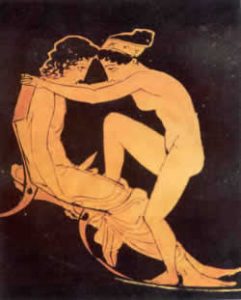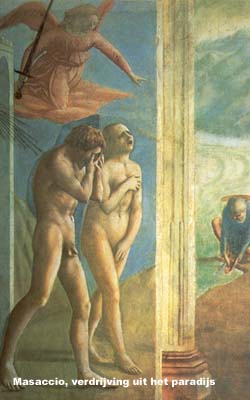creationmyths
 Creation stories are stories (myths) invented by people about the origin of the world. Not told for entertainment and moral teaching alone, but with the purpose to explain. Myths are thus the basis of religion as well as of science.
Creation stories are stories (myths) invented by people about the origin of the world. Not told for entertainment and moral teaching alone, but with the purpose to explain. Myths are thus the basis of religion as well as of science.
Myths
Creation myths originated tens of thousands of years ago, when our ancestors had developed sufficient linguistic competence to produce storytellers. Myths were passed on orally, and thus took on different forms. The myths that we know have been passed on to us from more recent written sources, usually not older than a few thousand years.
Sexual starting point of creation myths
The creation myth illustrates the sexual starting point of religion. To begin with, there is the distinction between male and female gods. The father God of the Jewish Bible, and thus of Christianity and Islam, creates the world from a distance, and leaves man free to make choices. The mother god of Hinduism, Buddhism is the earth itself, on which man and all other creatures are born, die, and are born again. This remains a fundamental difference between western and eastern religions and of their respective socio- sexual developments.
Creation myths & reproduction
In nearly all creation myths, the genesis of everything is sexual intercourse or an egg that is hatched out. Reproduction is thus a central event in religious discourse just as it is the most important and central activity of all living beings, including humans. The creation myth illustrates what ideas Homo Sapiens, probably as early as 20,000 years ago, had about the world. The telling of the story is evidence of man’s extraordinary evolutionary jump forward. The creation myths thus illustrate the unique character of human ‘culture’, while at the same time demonstrating how deeply rooted in ‘nature’ it is.
Creatinon myths & the bible
Many people know the creation myth as it is told in the Bible, simply because it is still being passed on, from parents to children, at schools, and in everyday language. Everybody knows of Adam and Eve, because they still figure in stories and jokes. Even paleoanthropology, which researches our distant past over millions of years, calls our early ancestors Adam or Eve. The details of the first Bible book, Genesis, are less well known. Few people know there are two different creation stories even on the first pages of Genesis, which contradict each other. Obviously the Bible was originally a compilation of stories written down after having been passed on orally for thousands of years. The word ‘mythology’ usually reminds us of the ancient Greeks of more than 2500 years ago. This is owing to our educational tradition, which distinguishes between the Christian stories, which people took to be true, and the Greek stories, which they called ‘myths’ (untrue stories). The Christian God, they say, was really seated in heaven, fought against Satan, had a host of angels and a son on earth; but the Greek god Zeus, who lived on the Olympus, fought against the Giants, had a host of angels (messengers) and had several sons on earth, that, the Christian teachers said, was ‘mythology’.
